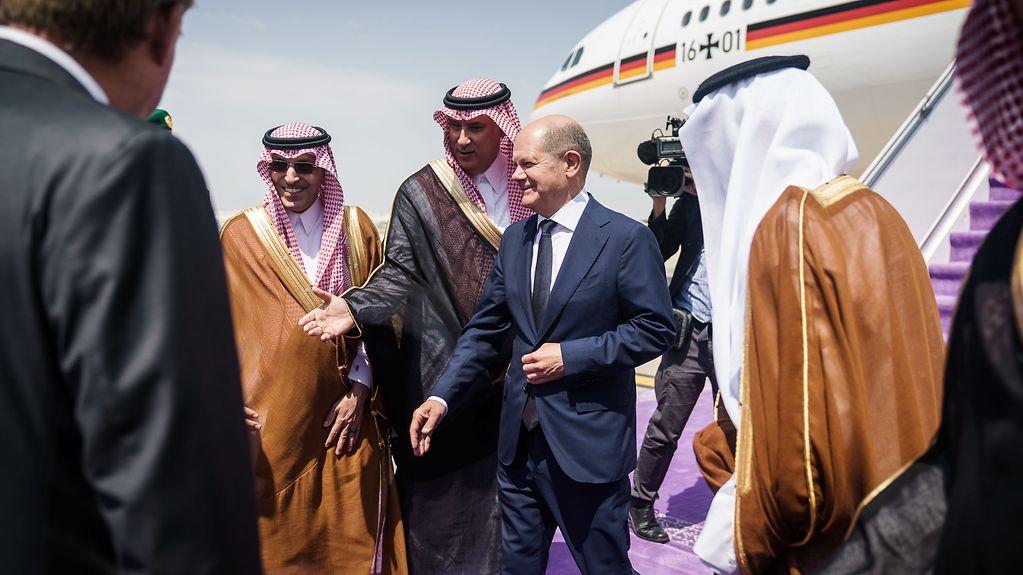The Federal Chancellor in the Middle East
Federal Chancellor Olaf Scholz has completed his tour of the Gulf states, where he visited Saudi Arabia, the United Arab Emirates and Qatar. The Federal Chancellor stressed that it was right and important to discuss development in the region, opportunities for economic relationships and the political challenges that face us.
3 min reading time

Federal Chancellor Scholz arriving in Saudi Arabia. The close relationship between Germany and the Gulf states has a long history.
Photo: Bundesregierung/Denzel
The Gulf states are major partners for Germany in a region afflicted by many conflicts. Our countries are connected by close economic relationships that are not limited to the energy sector. We are united by a shared interest in stability and security, both in the Middle East and in other parts of the world.
As a regional power, Saudi Arabia has started a journey of internal reforms and openness to the outside world. Germany intends to support and encourage the country in partnership with western partners, on issues such as human rights and rapprochement with Israel. The United Arab Emirates are Germany’s key economic partner in the Arab world, while Qatar is one of the most significant suppliers of liquefied natural gas.
High level political talks
Federal Chancellor Olaf Scholz visited the Gulf region over the weekend, with Saudi Arabia as his first port of call. There he held detailed talks in Jeddah with Crown Prince Mohammed bin Salman, after which he discussed the situation for women in Saudi Arabia female academics, entrepreneurs, students and artists.
“It’s clear that talks in the Gulf are not easy, but they are important,” the Federal Chancellor said. He explained that his talks in Jeddah with the Crown Prince focused on renewable energy, economic cooperation, Russia’s attack on Ukraine and the importance of human rights.
Focusing on energy security
Late on Saturday afternoon, the Federal Chancellor flew on to the United Arab Emirates, where he met President Mohammed bin Zayed. “We have promoted a wide range of projects on producing and purchasing diesel and gas. We have LNG projects that play a role in this, and of course there are various aspects to do with modernisation, such as IT projects,” the Federal Chancellor said.
With regard to Germany, he stressed the importance of improving the current supply situation and expanding our options so that we are no longer limited to a few suppliers, as was the case in the past. He added that we needed a diverse range of sources to be able to guarantee energy security in Germany, and that the long-term development of our economy into a climate neutral economy was also important. The Federal Chancellor pointed out that this would only be possible through close cooperation with those countries that had previously played a major role in supplying fossil resources.
Issues in regional politics
Scholz stressed that he had also addressed issues in regional politics, particularly those concerning the situation in Yemen. He added that there was agreement on the need to continue working on peaceful developments in Yemen and an extension of the current ceasefire, and emphasised that there was a willingness to work together and make every effort to stabilise the government in Yemen.
On Sunday afternoon Scholz went on to Qatar, the final stop on his trip. There the Federal Chancellor held talks with Emir Tamim bin Hamad Al Thani. The itinerary also included meetings with business leaders and tours.
Summing up his talks in Qatar, the Federal Chancellor said he had discussed future energy supplies and political issues with the country’s political leaders. “Those were topics that revolved around human rights issues, questions about civil rights and opportunities to express differing opinions,” said the Federal Chancellor.
Business delegation accompanies the Federal Chancellor
The Federal Chancellor was accompanied by numerous representatives of German businesses from various sectors, acknowledging the Gulf states’ importance not only as partners for Germany in oil and liquefied natural gas, but also for renewable energy, for the green hydrogen that is so important for Germany’s energy transformation, and in many other areas.
The close relationship between Germany and the Gulf states has a long history. Saudi Arabia, the United Arab Emirates and Qatar are familiar with Germany. They trust German politics, cooperate with German companies and value Germany’s research landscape.
Global challenges
Along with economic and bilateral issues, the Federal Chancellor’s agenda included current foreign policy issues. Further matters that need to be addressed include the global climate crisis and other global challenges, not least food shortages caused by Russia’s invasion of Ukraine, which are particularly evident in the Middle East.